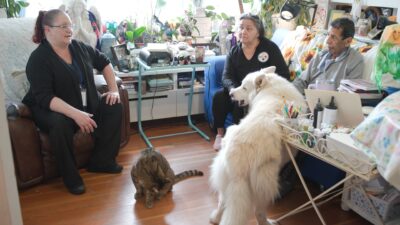Loss — especially the death of a loved one — is among life’s greatest stressors. It can affect you in physical, cognitive, emotional, behavioral, social, spiritual, and practical ways.
Uncomfortable and sometimes complex feelings are natural responses to the death of a loved one. Everyone responds differently, but it is common to feel intense sadness, anger, remorse, regret, and/or longing after a loss.
Guidance for Grievers
It is important to take care of yourself during the grieving process.
Remember that the grief experience is different for everyone. You may be highly emotive or find other ways to express your grief, such as through activity. You may reminisce about the person or your relationship.
Express your grief. Bottling up your grief is unlikely to be a helpful coping strategy, so allow yourself to feel and express your emotions.
Cry when you need to cry. If you are angry, find safe ways to release your anger by punching a pillow or screaming in a place that won’t alarm others. If it is comforting, think about your loved one, sort through happy or painful memories, or reminisce. Or channel your grief into action, perhaps by creating some form of legacy to honor your loved one’s memory.
Move forward at your own pace. Grieving is a process that takes time but has no set schedule. Trust that the pain of loss will lessen with time and that you will find meaningful ways to incorporate your loved one’s memory into your life.
Realize that the way you grieve may be different from others’, even if you are grieving the same death. The way you grieve is not a measure of your love, and the easing of your grief is not the end of a connection to the person who died.
Take gentle care of yourself. Practice self-compassion while you are grieving. Try to be patient with yourself and your grief. Replenish your body and mind by eating right, staying hydrated, and sleeping well.
When you feel up to it, incorporate physical activity into your day. Any form of physical exercise can reduce tension, stress, and sadness. Cooking, gardening, meditation, or other purposeful activities may be helpful, too.
Let others help. In the midst of grief, your sadness and suffering may feel overwhelming, even isolating. Reach out to family, friends, or professionals trained to provide grief support. They can help you get through the pain — moment by moment at first, then hour by hour, then day by day.
Remember that people can help in different ways. Some are good listeners, while others are willing to tackle chores. Even close family and friends may be uncomfortable talking about your loss, but most want to be supportive. Given the opportunity, they can provide a momentary respite from grief.
Join a support group. Hospice providers make grief support available to anyone whose loved one died in hospice care. Many hospices offer grief support groups for bereaved people in their community regardless of whether the death occurred in their care.
Grief groups are available online or in person. Those who attend find comfort in knowing they are not alone in their grief. They learn from others as they adapt to loss.
To find a grief support group, first contact the hospice that cared for your loved one. If hospice wasn’t involved in their care, reach out to a hospice that serves your community. You also can use the Ask HFA form on this website, or call HFA at 202-457-5811 for help in finding a support group in your area.
Keep a journal. Some people find that journaling is a powerful means of expressing pain and venting difficult emotions.
Feelings like regret, jealousy, relief, and anger are common in grief, but they can be hard to share with others. Journal writing can offer a healthy release and a chance for meaningful self-expression, providing a private way to work through the many emotions that accompany grief.
Try bibliotherapy. Reading memoirs, self-help books, or novels by those who have experienced loss can help you gain insights and find strategies for moving forward.
Bibliotherapy can be useful with or without a therapist’s guidance; it works well for both adolescents and adults.
Learn about grief. Understanding grief can be validating and comforting. It can also dispel the many myths about grief that may be unhelpful during the grieving process. Evidence-based research about grief can be found at libraries, online, and in journals and books written by thanatologists, people who specialize in the study of death and grief.
Visit the Research on grief page here to learn more. HFA’s Journeys, A Newsletter to Help in Bereavement, is a monthly newsletter filled with useful information. On Facebook, the Journeys with Grief page is another way to learn more about grief.
Practice gratitude. Expressing gratitude won’t erase your pain, but it will give you a momentary break from grieving. Feeling thankful is uplifting; for a moment, you are free of pain.
Discover and express your gratitude by making a list each day of 10 people or things that fill you with gratitude. Practicing gratitude may also give you solace and help you to eventually move forward.
When to seek professional help
Most people adjust to loss, even though it is painful, stressful, and uncomfortable. But about 10% to 15% of people who are grieving have impaired or complicated reactions to loss.
Grief experts generally agree that if your grief is unmanageable, or you have not returned to your pre-loss level of functioning within six to 12 months after a loss, it is time to seek the professional help of a grief counselor or other trained professional. Learn more about grief complications.
Responding to hurtful comments
Many people find it difficult to respond to someone else’s loss. They feel uncomfortable, unsure of what to say or how to say it. Not knowing how to react sometimes causes them to say things that seem insensitive, hurtful, or disrespectful.
Generally, people do not intend to be insensitive; they are trying to convey support or restore normalcy. But these comments can invalidate or trivialize your grief, making you feel misunderstood or disenfranchised.
Responding in ways that affirm your grief and help others understand how to be more supportive helps to re-establish your sense of control.
| If someone says … | You might respond … |
| I’m so sorry about Jan’s death. At least you have other children. | My children are a great comfort, but I will always miss Jan. So will they. |
| Your mother was sick for such a long time. I guess everything always happens for the best. | I am grieving deeply and find it hard to imagine that I will ever think that losing my mother was for the best. |
| My gentle advice: Cleaning out his closet and getting rid of the reminders of him as soon as possible will really heal you. Let me know if you want help. | Everyone grieves differently. What works for you may not be what works for me. I’ll know when the time is right. |
| I heard that your brother died. Your parents must be devastated. | Of course they are grieving their loss, and I’m very sad as well. My brother and I were very close. |
| It’s a tragedy that Sue died, but you’re still so young. You’ll be married again in no time. | I don’t know what the future holds. Right now I am grieving Sue, and I suspect that part of me always will. |
| Sorry about your loss, but I’m so glad to see you back in the office. Picking up your job responsibilities was killing me. | I appreciate your help. I hope you never experience losing someone you love, but if you do, I’ll gladly return the favor |
| You got divorced 15 years ago, so I’m sort of struggling to figure out why you’re so upset that he died. | I am grieving not only his death, but also that our marriage didn’t last. Even though we divorced, he was special to me. |
| It’s terrible that your sister died. At least it was fast. | I’m relieved that she didn’t suffer, but that doesn’t lessen the pain I feel about her death. |
| When you stop grieving, I guess you’ll enjoy a newfound freedom since you’re no longer a caregiver. | It’s taking me time to adjust, and I’m sure I’ll never stop grieving completely. I miss caregiving because it involved the person who mattered most to me. |


